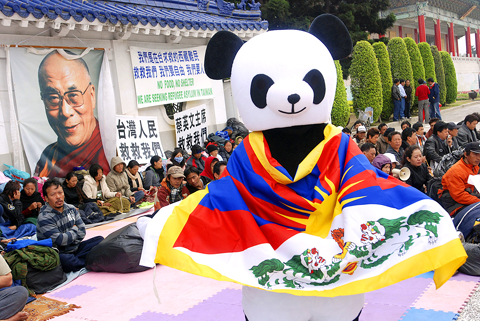Tibet supporters and human rights groups yesterday urged the government to amend the Immigration Act (出入國及移民法) and pass an asylum bill to grant legal status to Tibetans and other international refugees.
“The government said that it will issue temporary residency to the Tibetans [in the group on Liberty Square in Taipei], but it’s not the final solution to their problems as temporary residency does not allow them to work,” Taiwan Friends of Tibet vice-chairman Yang Chang-chen (楊長鎮) told a press conference at Liberty Square.
More than 100 Tibetans living in Taiwan without legal status have been staging a sit-in demonstration on the square since Sept. 9, pleading with the government to grant them asylum.

PHOTO: CHIANG YING-YING, AP
Many of them had made the dangerous crossing through the Himalayas into Nepal before coming to Taiwan on forged Nepalese or Indian passports.
After a meeting with Tibetan and human rights activists on Monday, the government said it would likely issue temporary residency permits to the Tibetans and help them find shelter so that they could at least live in the country legally.
The activists, however, don’t think the government has gone far enough.
“The Tibetan pandas enjoyed a high-profile warm welcome, while the Tibetan refugees were left aside — this is not good for Taiwan’s international image,” Yang said.
China’s Wolong National Nature Reserve, the major habitat for pandas, is in a part of Sichuan Province that was traditionally a Tibetan domain and was part of an independent Tibet before the Chinese invasion in 1959.
After the activists performed a short play to reenact segments of Tibetan history, some of the Tibetan protesters presented khatas — a traditional Tibetan scarf used to show welcome or respect to someone — to an activist wearing a panda costume to show that that they hoped to live happily together in Taiwan as they once did in Wolong.
“Our first choice is to have a refugee bill so that all international refugees could benefit from it,” Yang said.
“If not, we would settle for a revised Immigration Act that adds a special clause for the Tibetans here,” Yang said.
While the Democratic Progressive Party legislative caucus and some individual Chinese Nationalist Party (KMT) lawmakers have shown interest in helping the Tibetans, Yang said he hoped the issue could be resolved as soon as possible.

Alain Robert, known as the "French Spider-Man," praised Alex Honnold as exceptionally well-prepared after the US climber completed a free solo ascent of Taipei 101 yesterday. Robert said Honnold's ascent of the 508m-tall skyscraper in just more than one-and-a-half hours without using safety ropes or equipment was a remarkable achievement. "This is my life," he said in an interview conducted in French, adding that he liked the feeling of being "on the edge of danger." The 63-year-old Frenchman climbed Taipei 101 using ropes in December 2004, taking about four hours to reach the top. On a one-to-10 scale of difficulty, Robert said Taipei 101

Nipah virus infection is to be officially listed as a category 5 notifiable infectious disease in Taiwan in March, while clinical treatment guidelines are being formulated, the Centers for Disease Control (CDC) said yesterday. With Nipah infections being reported in other countries and considering its relatively high fatality rate, the centers on Jan. 16 announced that it would be listed as a notifiable infectious disease to bolster the nation’s systematic early warning system and increase public awareness, the CDC said. Bangladesh reported four fatal cases last year in separate districts, with three linked to raw date palm sap consumption, CDC Epidemic Intelligence

Two Taiwanese prosecutors were questioned by Chinese security personnel at their hotel during a trip to China’s Henan Province this month, the Mainland Affairs Council (MAC) said yesterday. The officers had personal information on the prosecutors, including “when they were assigned to their posts, their work locations and job titles,” MAC Deputy Minister and spokesman Liang Wen-chieh (梁文傑) said. On top of asking about their agencies and positions, the officers also questioned the prosecutors about the Cross-Strait Joint Crime-Fighting and Judicial Mutual Assistance Agreement, a pact that serves as the framework for Taiwan-China cooperation on combating crime and providing judicial assistance, Liang

US climber Alex Honnold left Taiwan this morning a day after completing a free-solo ascent of Taipei 101, a feat that drew cheers from onlookers and gained widespread international attention. Honnold yesterday scaled the 101-story skyscraper without a rope or safety harness. The climb — the highest urban free-solo ascent ever attempted — took just more than 90 minutes and was streamed live on Netflix. It was covered by major international news outlets including CNN, the New York Times, the Guardian and the Wall Street Journal. As Honnold prepared to leave Taiwan today, he attracted a crowd when he and his wife, Sanni,